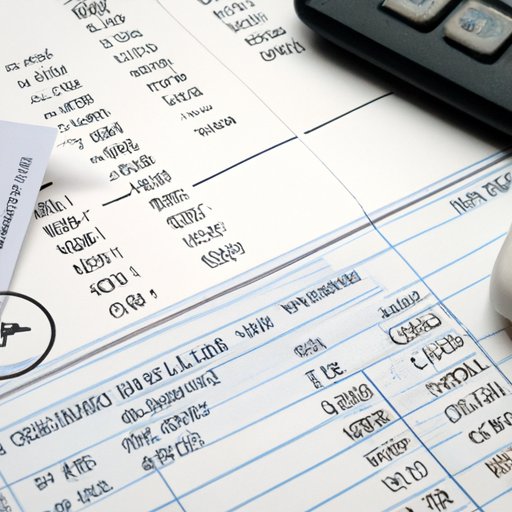
Introduction
Understanding cash deposit limits is important for anyone who deals with cash regularly. Whether you’re a small business owner, freelancer, or just someone who wants to deposit a substantial amount of cash, it’s crucial to know the guidelines and limitations that banks have put in place. In this article, we’ll explore how much money you can deposit into a bank account and what you need to know before making a deposit.
The Basics of Cash Deposits – Understanding Limits and Guidelines
Before diving into the specific deposit limits, it’s essential to understand the different types of cash deposits. The types of deposits are categorized by their source, such as cash, checks, or wire transfers. When it comes to cash deposits, banks have specific guidelines that must be followed to comply with federal laws and regulations.
These guidelines include keeping accurate records of deposits, reporting suspicious activity and transactions over a certain amount, and verifying the identities of customers making deposits. By following these guidelines, banks can prevent fraud, money laundering, and terrorism financing.
How Much Money Can You Deposit into a Bank Account? Here’s what you need to know
The amount of money you can deposit into a bank account varies depending on several factors. First, the type of bank account you have will determine the deposit limit. Checking accounts typically have higher deposit limits than savings accounts, while money market accounts may have higher limits than both.
Second, different banks have different deposit limits, and these limits can vary based on account type, the length of time the account has been open, the customer’s standing with the bank, and other factors. For example, Chase Bank has a deposit limit of $2,000 a day and $5,000 a month for non-customers, while Bank of America allows non-customers to deposit up to $10,000 a month.
Cash Deposit Rules Explained: How Much Can You Deposit in a Bank?
While banks set their deposit limits, there are also federal rules and regulations for cash deposits that must be followed. The Bank Secrecy Act (BSA) requires banks to report any cash deposits over $10,000 made in a single transaction or in a series of related transactions. This reporting is done through a Currency Transaction Report (CTR), which helps track and prevent suspicious activity.
Banks also have systems in place to monitor cash deposits below the $10,000 threshold for signs of suspicious activity. This means that even if you’re depositing less than $10,000, your deposits may still be flagged and reported to the authorities if the bank suspects any wrongdoing.
The Ultimate Guide to Depositing Cash: What You Need to Know About Limits
Several factors can affect deposit limits. For example, banks may limit the amount of cash that can be deposited by non-customers or new customers. The type of cash being deposited can also impact the limit. For example, banks may have lower limits for deposits of coins or foreign currencies.
Exceeding cash deposit limits can result in consequences, including account restrictions, account closure, or even legal action. It’s crucial to plan your deposits ahead of time and stay within the legal limits to avoid any issues or penalties.
How much cash can you deposit at a bank? Here’s what the top financial experts advise
Financial experts advise depositing cash amounts that are consistent with your income and spending patterns. Deposits that are significantly higher than your usual activity may raise red flags and lead to additional scrutiny from banks and regulatory agencies.
Experts also recommend keeping accurate records of all cash deposits and being prepared to explain the source of funds if necessary. Maintaining detailed records can help avoid any misunderstandings and keep your accounts in good standing.
The Ins and Outs of Cash Deposits: What You Should Know Before You Make a Deposit of Substance
Making large cash deposits can be challenging, as banks may require additional documentation and may need to verify the source of funds. It’s crucial to have proper identification, records of the source of the funds, and a plan for how the cash will be used after it’s deposited.
One strategy for making successful cash deposits is to spread out the deposit over multiple days or transactions. This can help avoid triggering any red flags and ensure that the deposit is processed smoothly. If you encounter any issues with your deposit, it’s essential to remain calm, ask questions, and work with the bank to resolve any problems.
Conclusion
Understanding the limits and guidelines for cash deposits is essential for anyone who deals with cash regularly. By following the rules and regulations set by banks and the government, you can avoid penalties and ensure that your accounts remain in good standing. Whether you’re making a small deposit or a large one, being prepared, staying within legal limits, and keeping accurate records can help make the process go smoothly and successfully.





